Sponsors  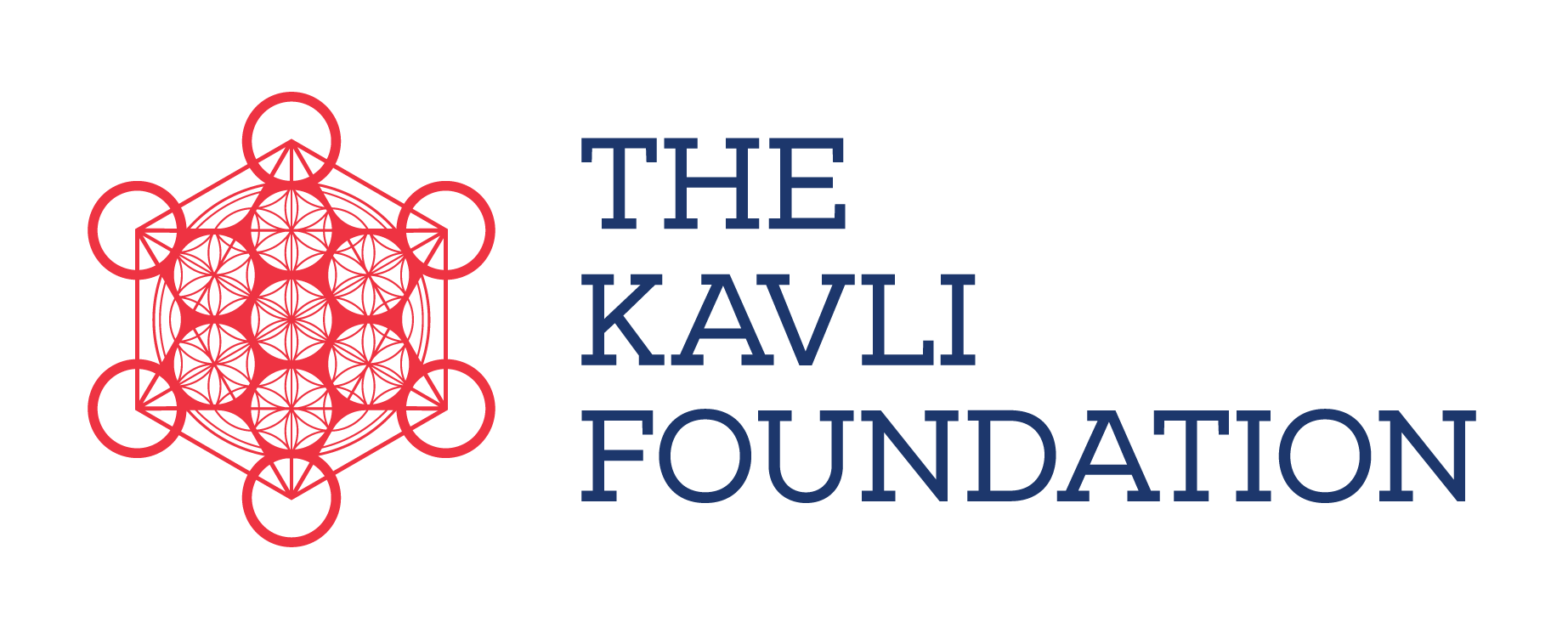       ScheduleThe following schedule is a list of all sessions and activities in chronological order. Most events are one at a time, but some workshops and professional development sessions will be held concurrently. Sessions are 60 minutes unless otherwise stated. Note the start times for each session in the header above the session titles. The links on the 'UTC' times take you to a timezone conversion website for you to to confirm the start time in your local timezone. All links to the Zoom event or the virtual meeting space in Gather are listed below. See the attendee guide for an introduction to navigate the meeting webpages and virtual platforms. Attendee Guide
Pre-MeetingBusiness MeetingThis year our 'State of the Society' gathering will be the day before the annual meeting begins. All INS members are encouraged to attend. President Nita Farahany will provide a retrospective on her time in office and pass the reins to the incoming president, Joseph J. Fins. Committee chairs will also give updates about their respective accomplishments in the past year and highlight upcoming opportunities for people to volunteer or take advantage of in 2022. Join us!
Recordings
NetworkingAt the conclusion of the Business Meeting, people will be convening in the Gather virtual meeting space to view the poster hall and socialize with colleagues. All members and meeting attendees are welcome to join.
Day 1NetworkingAttendees are encouraged to review the full schedule and familiarize themselves with our virtual meeting space: Gather. Many attendees will be convening in Gather prior to the first discussion.
Regional ShowcasesNetwork with representatives from different institutes, centers and networks from around the world who are focused on neuroethics. Learn about what issues they are actively addressing and discuss possible opportunities for collaboration. Presentations will take place at the gathering squares in Gather.
Poster PresentationsBrowse all the posters, slides, and recorded presentations submitted to the meeting. Get a sense of the breadth of neuroethics scholarship and identify those you can't miss. Then head over to Gather, where many investigators will be in the virtual poster hall talking about their research.
Exploring Social Justice and NeuroethicsLeaders in neuroethics and social justice disciplines will guide a discussion among the session attendees to explore these questions and arrive at a better understanding of the path forward for social justice and neuroethics.
Panel // Thursday · 12:00p EDT · 16:00 UTC · 5:00p CET · 9:30p IST / Friday · 1:00a KST · 3:00a AEDT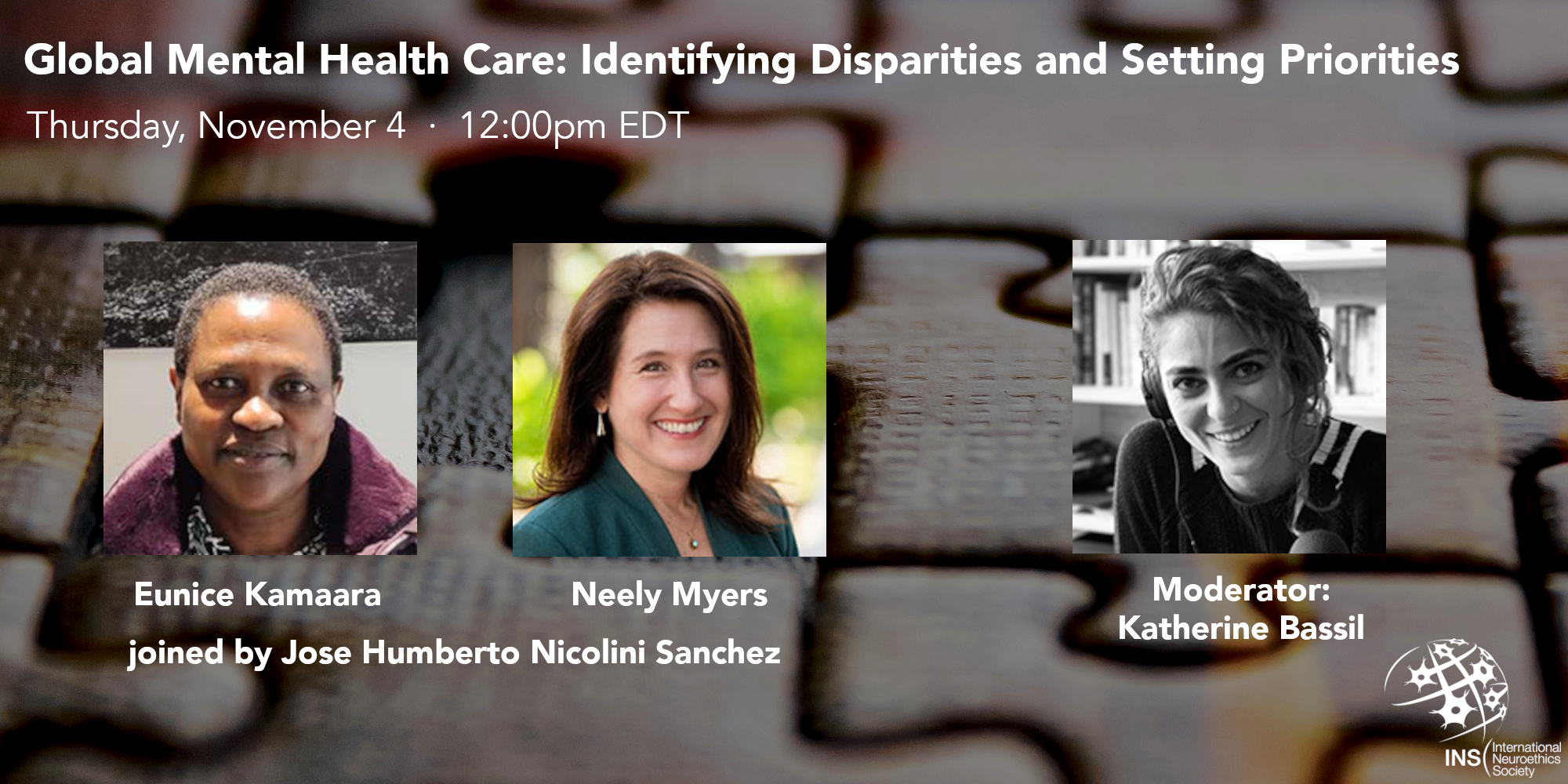 Global Mental Health Care: Identifying Disparities and Setting PrioritiesOrganizations like the World Health Organization have identified mental health care as a key component of health care, declaring "there is no health without mental health." The prioritization of mental health, however, varies widely between countries, access to it is often determined by their social and economic status, and personal willingness to seek care can be complicated by cultural circumstances. This panel will explore how mental health care intersects with nationality, nationality gender, sexual orientation, and/or disability in an international context. Panelists will examine how mental health is understood across local and international contexts, how disparities in mental health have social and economic determinants, how mental illness is caused by or is co-morbid with marginalization and persecution, how mental health care neglects marginalized people, and how we can be more just in treating mental illness.
DISCUSSION // Thursday · 1:30p EDT · 17:30 UTC · 6:30p CET · 11:00p IST / Friday · 2:30a KST · 4:30a AEDTJustice, Religion and Neuroscience: Promoting Socially Transformative WellbeingSocial justice is defined broadly as a shared goal of addressing patterns of domination, oppression, and marginalization on the basis of nationality, race, gender, ability, economic status, and religion, in order to promote equitable wellbeing. This interest in human wellbeing and flourishing is shared by both neuroscience and religion. This panel will explore the intersections between religious practices that aim to improve wellbeing by transforming individual and collective abilities to counteract oppressive and dominating social forces, and neuroscientific research that aims to explain the effects of these negative forces on the brain and uncover the neural basis for these resilient abilities. Through conversation, we aim to describe how different faith communities interact with neuroscientific research, as well as ways in which the brain sciences engage with these communities, in the shared pursuit of justice and flourishing.
Panel // Thursday · 3:00p EDT · 19:00 UTC · 8:00p CET / Friday · 12:30a IST · 4:00a KST · 6:00a AEDT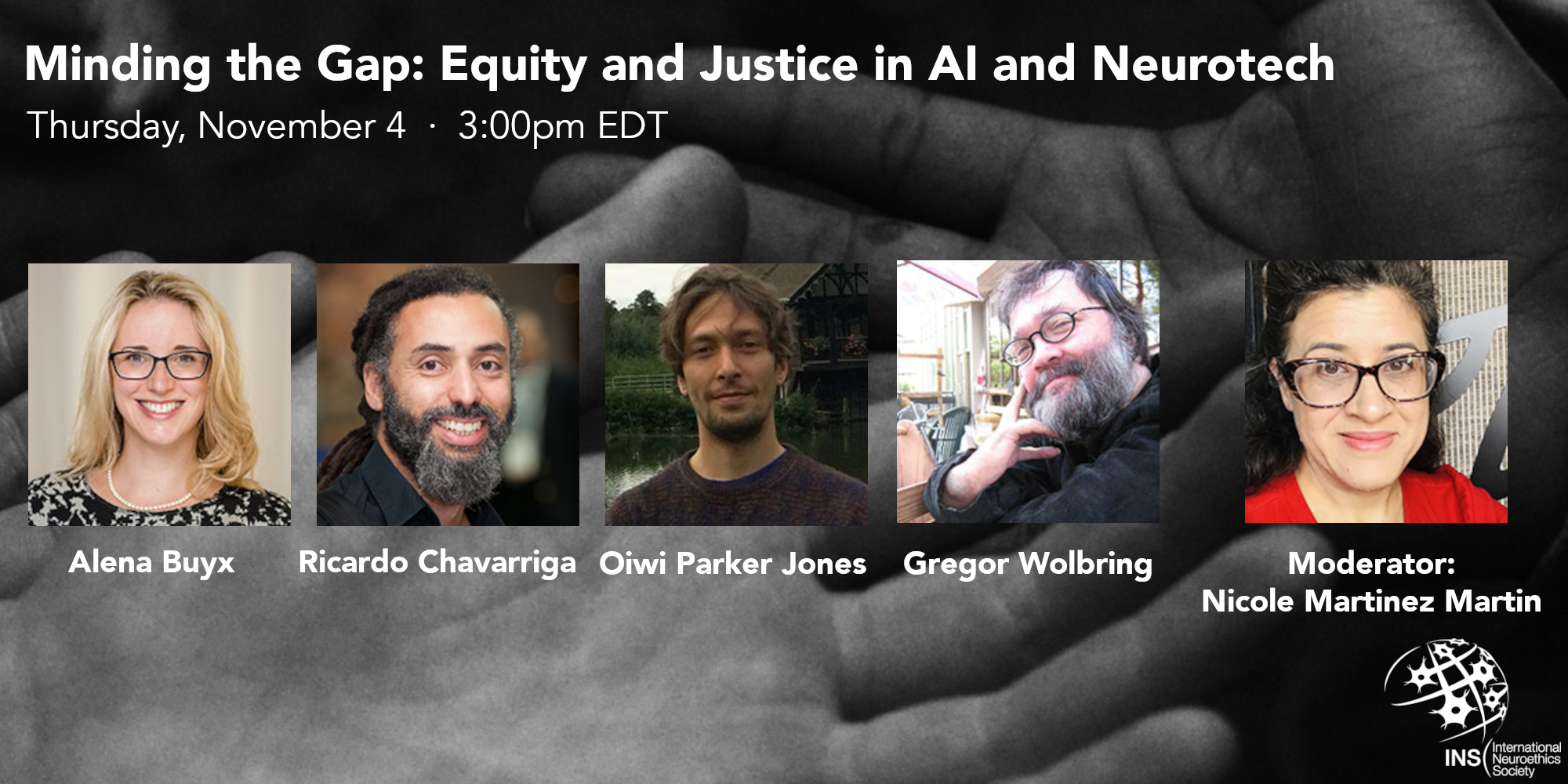 Minding the Gap: Equity and Justice in AI and NeurotechEthical scrutiny of AI-driven neurotechnologies has often focused on potential risks to individuals rather than on societal implications or justice issues. Lack of attention to diversity and equity while developing and implementing these devices can lead to limitations in how they work for people in different social contexts — or for people of different racial, cultural, linguistic, or disability backgrounds. This panel will engage questions regarding diversity and inclusion, privacy and surveillance, in the development and implementation of artificial intelligence for neurotechnologies.
Recordings
Building Strong Mentor–Mentee Relationships
Publishing and Writing
Presentations // Thursday · 6:00p EDT · 22:00 UTC · 11:00p CET / Friday · 3:30a IST · 7:00a KST · 9:00a AEDTResearch PresentationsInvestigators will give a 10-minute presentation about their research and answer audience questions for about 5 minutes. Presentations will be live or a video recording. This session is 75 minutes.
Recording
Workshop // Thursday · 7:30p EDT · 23:30 UTC / Friday · 12:30a CET · 5:00a IST · 8:30a KST · 10:30a AEDTDepictions of Disability and NeurotechnologyHuman subjects research on invasive neurotechnologies often relies on people with disabilities who are seen as both the future first beneficiaries of neurotech, and first on the neurotechnology frontier. Yet the benefits of neurotech are proposed in ways that lean on ableist goals of 'fixing disability' or 'improving quality of life.' This session would compare how disability is depicted in media with the actual lives of disabled people.
Regional ShowcasesNetwork with representatives from different institutes, centers and networks from around the world who are focused on neuroethics. Learn about what issues they are actively addressing and discuss possible opportunities for collaboration. Presentations will take place at the gathering squares in Gather.
Poster PresentationsThose not attending the workshop are encouraged to browse the poster presentations and visit the virtual poster hall to talk with investigators about their research.
Day 2Poster PresentationsAttendees are encouraged to browse the poster presentations and visit the virtual poster hall to talk with investigators about their research.
Panel // Friday · 9:00a EDT · 13:00 UTC · 2:00p CET · 6:30p IST · 10:00p KST / Saturday 12:00a AEDT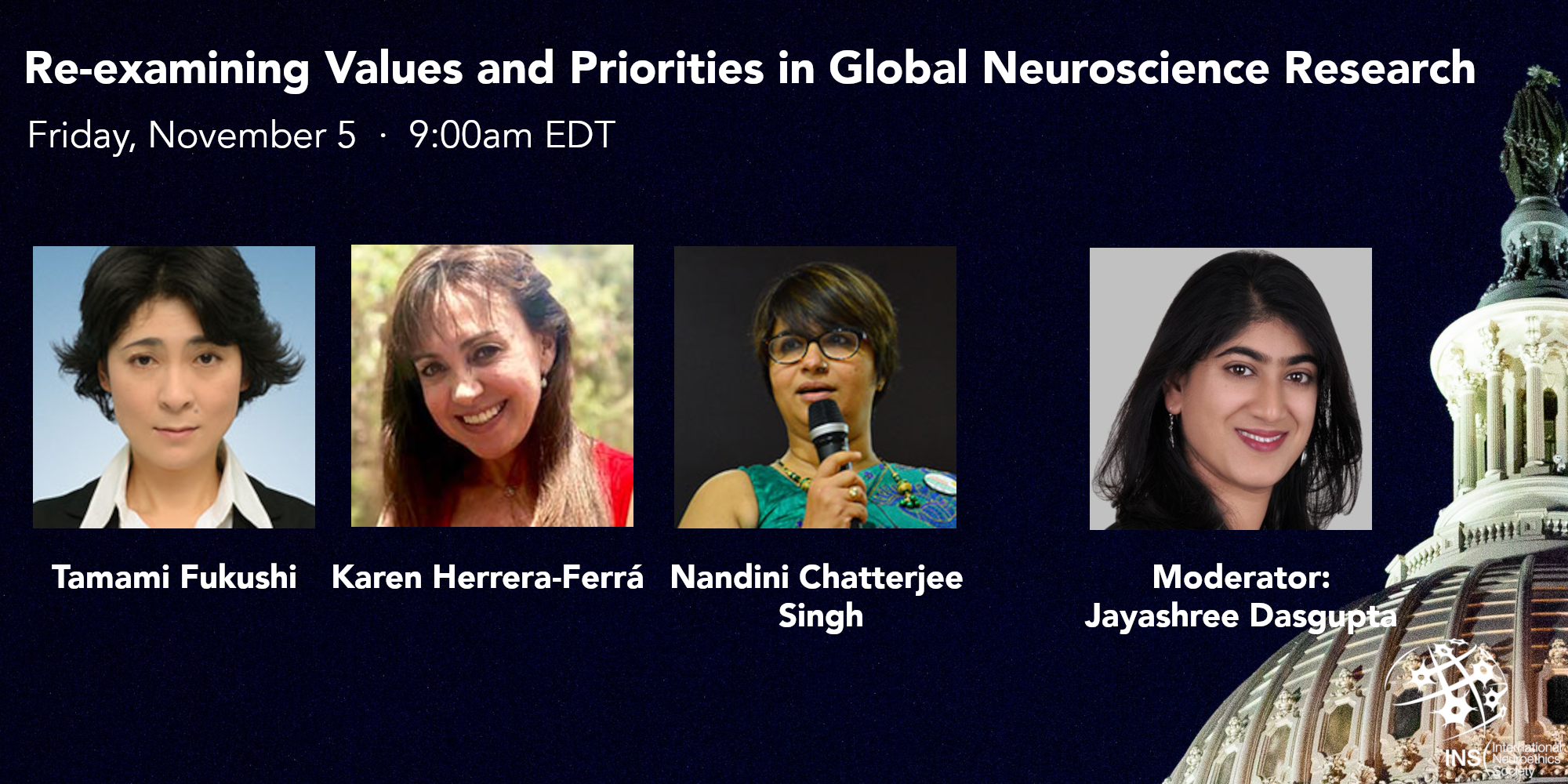 Re-examining Values and Priorities in Global Neuroscience ResearchThis session will feature a discussion of the specific priorities for development and use of neuroscience and neurotechnologies, including the type of opportunities available to develop and fund neuroscience and neurotechnology, as well as the need and challenges to engage diverse participants and communities in research globally. The discussion will also examine how current funding mechanisms might exacerbate or mitigate social injustice and inequities. The session includes panelists from countries with a diverse research and translational neuroscientific maturity.
Discussion // Friday · 10:30a EDT · 14:30 UTC · 3:30p CET · 8:00p IST · 11:30p KST / Saturday · 1:30a AEDTEnvironmental Neuroethics: Social Justice, and Steps AheadThe importance of the interrelationships of brain, mental health, and the environment is gaining global attention from both the point of view of biomedicine and ethics. This session will focus on social justice from the perspective of indigenous populations. We will discuss the next steps needed to catalyze cutting-edge science and technologies to improve understanding of the mechanisms through which the environment influences brain and mental health outcomes and formulate effective interventions. We will engage and learn from indigenous perspectives in order to inform decision-making at scientific and policy levels.
Assessing Rights-based and Legal Approaches to Protecting Mental PrivacyA number of developments in recent years have led to calls and proposals to provide protections for neural and mental data, including the availability of digital neural and behavioral datasets and advances in technologies to collect and analyze brain data. For this workshop, there will be discussion of human rights and other legal approaches to protecting mental privacy. Experts from the fields of neuroscience, law, and ethics will lead the discussion with attendees, addressing key issues such as: what types of data need additional protections, the rationales for different legal and rights-based approaches, and the promises and pitfalls for these different approaches.
Recordings
Developing an Anti-Racist NeuroscienceThe increased pace of neuroscientific discovery is poised to transform medical practice and behavioral policy. People of color, however, are too often either ignored, misunderstood, or exploited in brain and behavioral science research. This workshop will address a range of questions about how neuroscience should address issues of race, such as: How are biases encoding in studies themselves? Does diversifying researchers help hedge bets against bias in research design? How should researchers consider racial/ethnic differences, especially in light of racist historical origins of psychology and eugenics? How does one do neuroscience without being colorblind or racial essentialists? Are marginalized people targeted if they are the focus of research, or does ignoring them erase their existence?
Presentations // Friday · 1:30p EDT · 17:30 UTC · 6:30p CET · 11:00p IST / Saturday · 2:30a KST · 4:30a AEDTResearch PresentationsInvestigators will give a 10-minute presentation about their research and answer audience questions for about 5 minutes. Presentations will be live or a video recording. This session is 75 minutes.
Recording
Panel // Friday · 3:00p EDT · 19:00 UTC · 8:00p CET / Saturday · 12:30a IST · 4:00a KST · 6:00a AEDT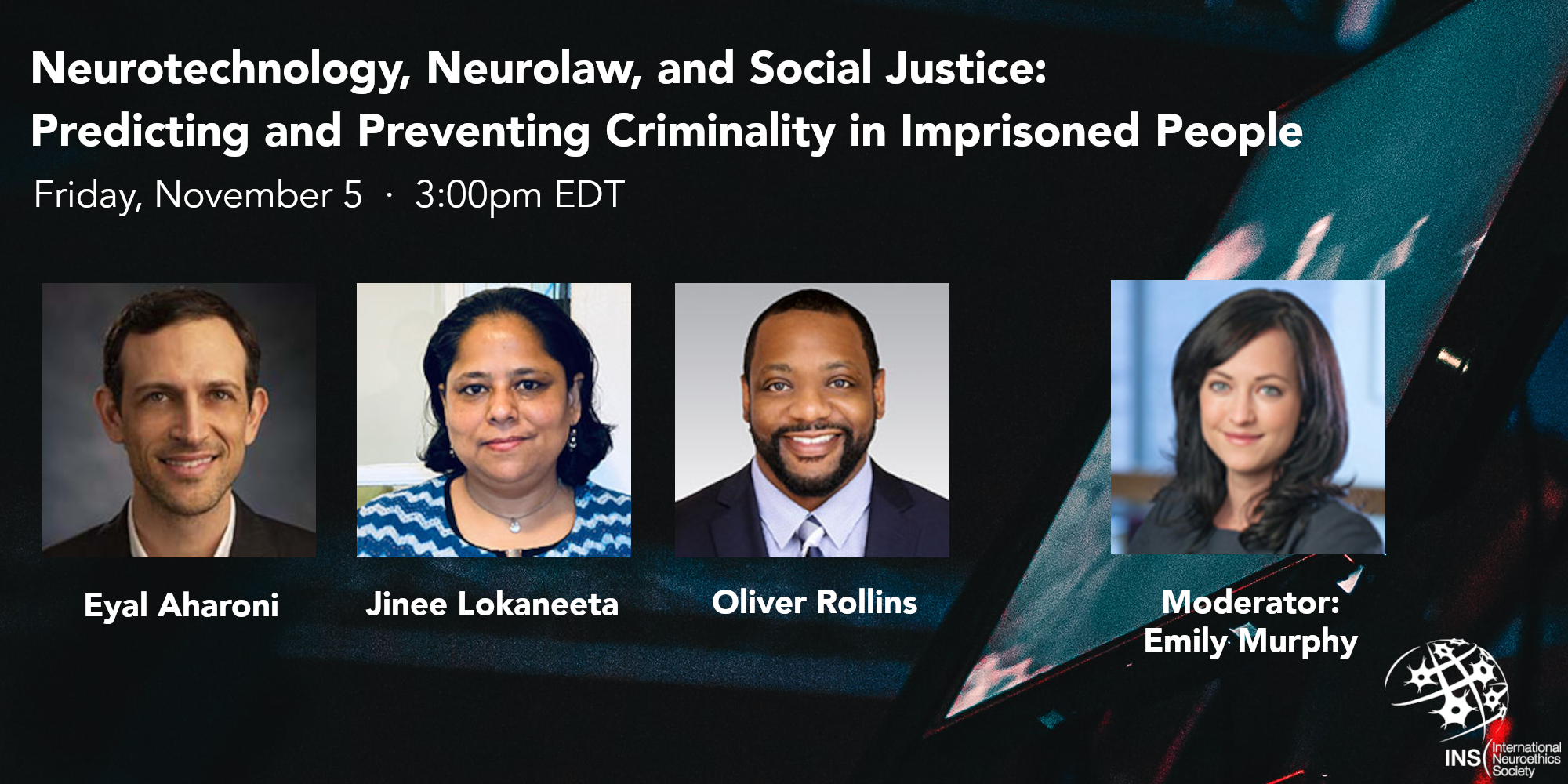 Neurotechnology, Neurolaw, and Social Justice: Predicting and Preventing Criminality in Imprisoned PeopleThe brain sciences continue to have considerable impact on surveillance, policing, legal practice, and incarceration. However, this influence carries the risk of worsening inequities or violating human rights. This session will explore the history and current practice of using the brain sciences to explain, predict, and prevent antisocial behavior — focusing on the consequences this has had and continues to have for vulnerable and marginalized communities globally. We will also consider the role neurotechnologies will play in the future of criminal law.
Recordings
Lecture // Friday · 4:30p EDT · 20:30 UTC · 9:30p CET / Saturday · 2:00a IST · 5:30a KST · 7:30a AEDTFred Kavli Distinguished Neuroethics Lecture

Photo courtesy University of Pennsylvania Anita L. AllenAnita L. Allen is the Henry R. Silverman Professor of Law and Professor of Philosophy at the University of Pennsylvania. She is internationally renown as an expert on philosophical dimensions of privacy and data protection law, ethics, bioethics, legal philosophy, women’s rights, and diversity in higher education.
Dr. Allen's lecture is titled: 'My Harvard Headache: Brain, Pain, and Black People.' This talk uses a harrowing personal experience with a 3-year headache to launch a discussion of opioid use and racial disparities in the context of the medical treatment of and social responses to adults experiencing headache pain, visual aura, photophobia, aphasia and other symptoms of migraine.
Recordings
With support from The Kavli Foundation, the International Neuroethics Society hosts the Fred Kavli Distinguished Neuroethics Lecture each year as part of our annual meeting. Previous lectures have been given by Ruha Benjamin, Martha J. Farah, Keith Humphreys and Patricia Churchland.  Gathering // Friday · 5:30p EDT · 21:30 UTC · 10:30p CET / Saturday · 3:00a IST · 6:30a KST · 8:30a AEDTAward CeremonyINS President Nita Farahany will recognize Patricia Churchland with the Steven E. Hyman Award for Distinguished Service to the Field of Neuroethics. The Hyman Award is bestowed annually to members of the scientific community who have helped develop the field of neuroethics.
Also to be recognized:
Poster PresentationsThose not attending either of the scheduled workshops are encouraged to browse the poster presentations and visit the virtual poster hall. Presentations will be accessible after this time, but this is your last chance to talk with investigators about their research.
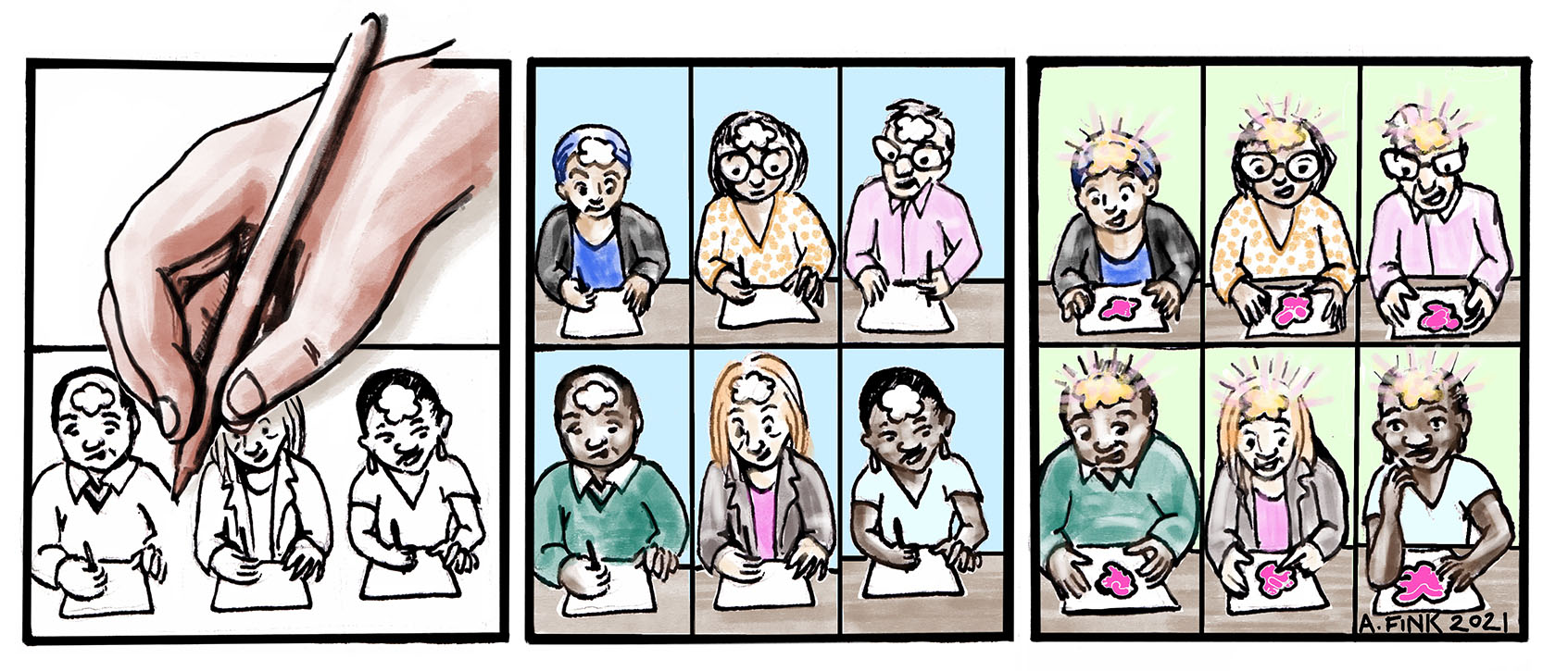
Illustration by Ann Fink Comics Workshop: Storytelling and Social Justice Concerns in NeuroethicsPublic conversations about neuroethics can be challenging, yet engagement of all stakeholders represents a key social justice concern. Comics — a narrative combination of text and image — are an especially important medium for opening lines of communication about fractious ethical questions. Comics have also proven to be an important way for historically marginalized people to tell their stories. Led by Dr. Ann Fink, this workshop will engage participants in creative drawing exercises that broach important social justice questions and foster discussion as a group. Dr. Fink will draw on a variety of creative traditions including insights from the field of graphic medicine, which uses comics to deeply explore patient and provider health narratives.
Neurotechnology with Everyone: Engineering the Building Blocks of Global ParticipationThroughout the past decade, do-it-yourself (DIY) neurotechnology communities have expanded as a result of increased accessibility of direct-to-consumer neurotechnologies and emergence of open-source software infrastructure including BCI2000, Brainflow, and Brains@Play. While the ethical, legal, and social implications of DIY neurotechnologies have been examined in detail, their communities have received little guidance on ethical innovation beyond that offered to academic and commercial counterparts. As DIY communities expand participation in neurotechnology across the global population, what guidance might the neuroethics community offer? This workshop will introduce participants to the state-of-the-art in DIY neurotechnology and gather preliminary guidance for the DIY community.
|


Discussion // Thursday · 10:30a EDT · 14:30 UTC · 3:30p CET · 8:00p IST · 11:30p KST / Friday · 1:30a AEDT